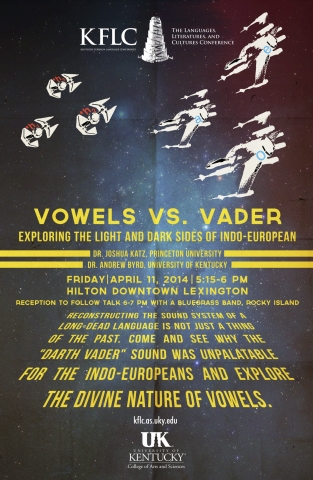09:00-09:10 - Welcome
09:10-09:40 - Ben Jones
Performing Down East: Dialect, Impression, and Temp Tales
"Temp Tales," a series of animated YouTube shorts by O'Chang Comics, presents the experiences of a temp worker recently relocated to Maine. As part of the performance, imitations are made of the dialectal features of rural and coastal regions. This talk examines the phonetic features that are used by the main performer, a native of Maine, in presenting this dialect. Comparisons are made between the performer's non-dialectal and dialectal speech to determine what features of the dialect are considered important in rendering the dialect.
09:40-10:10 - Michelle Compton
I Ain’t Gonna Give Up My Language: How to Perform Research Investigating the Use of Contrastive Analysis as a Method to Assist the Transition from Appalachian English to Standard American English
This presentation will explore and critique the methods for investigating contrastive analysis as a tool for instructing Appalachian students. This use of contrastive analysis is meant to ease students' transition from Appalachian English to Standard American English in a way that prevents harmful and negative ideologies about their vernacular dialect. My presentation will examine and compare the methods required for a study of this sort on two age groups: college students and high school students. I will also postulate on the benefits and significance of the study as a whole, as well as those for each individual age group.
10:10-10:30 - Morning Break
10:30-11:00 - Razia Husain
Linguistic Tools for the University of Kentucky Writing Center: A Proposal
This presentation will propose a collaboration between the UK Writing Center, Linguistics program, and department of Writing, Rhetoric, and Digital Studies in order to get more linguistics-based tools into the Writing Center so as to facilitate teaching and learning the composing process.
11:00-11:30 - Nathan Hardymon
English Becomes More Analytic?: A Proposal
This presentation will give a proposal for research that looks at English as becoming more of an analytic language with special attention paid to the auxiliary verbs "do" and "did" and the periphrastic superlatives and comparatives. Through corpus investigation, I hope to find some evidence of these verbs gaining some traction with uses like modals and of the superlatives and comparatives gaining more traction in the periphrastic forms diachronically.
11:30-12:30 - Lunch Break
12:30-13:00 - Sophie Moradi
How to Do Things with Verbs
Forthcoming
13:00-13:30 - Amber Thompson
Luvale Causative Morphology
Luvale is a Bantu language spoken by more than 600,000 people in Zambia and Angola. However, it has been widely understudied and almost no current literature is available on the language. In order to lessen this information gap, this presentation will focus on the description of one feature of Luvale Verbal Morphology--the causative derivations--which seems to be undergoing a change in usage since the time of the last complete grammar in 1949. This presentation represents the current stage of Amber's ongoing research for her M.A. thesis.
13:30-14:00 - Parker Brody
Morphological Agreement in Basque
Summary
14:00-14:20 - Afternoon Break
14:20-15:20 - Plenary Speaker - Mark Lauersdorf
Who used what language with whom and when? -- data-driven pattern identification, social network analysis, and other historical sociolinguistic 'hocus pocus'
15:20-16:00 - Closing

